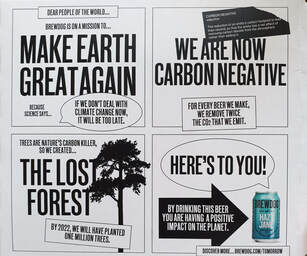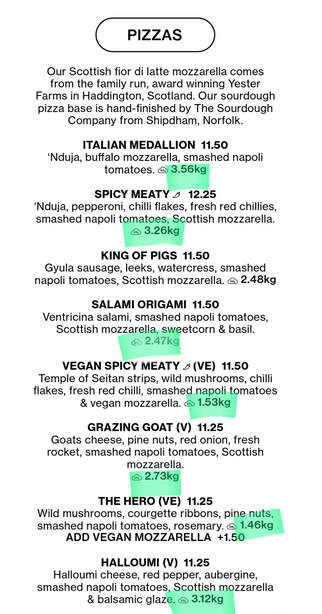 By the time Friday rolls around many of us will be cracking open a cold beer and enjoying the end of the week. However, like with everything nowadays, many of us are concerned about the environmental impact of our purchases and activities. Coinciding with the public's growing concern for the environment is the influx of marketing by companies to try and make their products seem to be the eco-friendly and ethical option and beer/alcohol companies are no exception. Perhaps leading the charge in this is Brewdog and as mentioned in my greenwashing article, it is important to investigate the activities of companies that market themselves in this way to determine how genuine they are. Eco-friendly information covers their packaging and fills their adverts but what exactly are Brewdog doing to better the process of making beer and can they justify their claim to being good for the planet or is it another case of greenwashing? **Quick Disclaimer** I am aware of the controversy that happened around Brewdog earlier this year with concerns over the workplace environment being raised by current and previous staff members and I of course do not support the idea of growth over the wellbeing of staff. I am also aware that often in their push for publicity they have made a few marketing errors. However, this article is not meant to put Brewdog on a pedestal or hail the owners as the pinnacle of ethical business practices. They have addressed the complaints and I sincerely hope that they work hard to ensure that their workforce is happy. This article simply looks at the strategies they are implementing to make their business more environmentally friendly and whether or not they can justify their use of eco-friendly branding. It is not often you see such a large company planning such a variety of environmentally-focused projects and I wanted to see if they were genuinely good ideas or just clever marketing. I can understand people would perhaps not support them as a company but I hope you enjoy the article. Carbon Negative Arguably, Brewdog’s eco-friendly reputation kicked off when they announced that they had become carbon negative in August 2020. Whenever I read that term my immediate response, unfortunately, is quite pessimistic, assuming that they are another company simply donating to an offsetting scheme and claiming to be saving the planet. Now, offsetting is part of Brewdog’s carbon negative status, however it is far from the only strategy being implemented. But let's kick things off with the offsetting. As mentioned in my article about such schemes, it is not the idea of offsetting that I have a problem with, only that often heavy polluters (I'm looking at you airlines) donate to offsetting schemes as their sole solution and want a big pat on the back. Brewdog have instead noted that some of their other projects will take time to set up and implement to a level that benefits the environment and instead use offsetting schemes as an interim solution. They also make a point of vetting the schemes that they donate to, ensuring that they are well accredited and reputable. With schemes in the UK (partnered with the Woodland Trust and Ribbles River Trust), Canada and Australia pledging to remove double what they emit, they are an example of one of the better uses of offsetting schemes. However, as mentioned they are only using this as an interim measure and it is far from their only strategy, so now on to some of the more interesting and ambitious measures. Brewdog Forest Just a quick mention of their own offsetting scheme involving the planting of 3 million trees in the Scottish Highlands. They have purchased 9,308 acres (larger than 17 countries) of land and through planting over 3 million native trees by 2025 their “Lost Forest” will become the largest native woodland in the UK. Alongside the trees this project also involves restoring thousands of acres of depleted peatlands. It is fantastic to see such an ambitious project focusing on planting native trees. Additionally, doing this in the region in which they are predominantly located, makes more sense than donating to a scheme that takes place in a different corner of the world.  Eco-friendly information and marketing covers Brewdog packaging. Eco-friendly information and marketing covers Brewdog packaging. Green Energy The Brewdog brewery in Scotland is hooked up directly to 3x 800kW wind turbines that ensures the plant is run on 100% renewable energy. This is a massive step, and it is brilliant to see a company set up and run-on green energy, making good use of the infamous Scottish weather. It may not currently be possible for every company to switch to 100% renewables due to the current state of the UK’s energy grid, but it is a positive step to see a company make it work. Circular Processing Arguably most impressive is Brewdog’s dedication to reducing waste and making use of any surplus in their production processes. Reduce, reuse, and recycle, we hear it frequently and they are written in order of importance. It is not easy to ask businesses to reduce their production when they rely on it for income and we know the often ineffectiveness of recycling, therefore reusing becomes ever more important. As with all manufacturing, there are inevitably waste products in the process of brewing beer, however Brewdog are making an effort to use these waste products in any way possible. Bio Plant Currently underway is the creation and implementation of a bio plant which will turn the waste water from brewing into clean water, food grade carbon dioxide, organic fertiliser, and green gas. Much of these products (notably the clean water and gas) will be cycled back into the brewing process, however they have also stated that more gas than they need will be produced and this will be go into the power grid. This both improves the waste situation within the brewery and goes towards decarbonising the grid. Carbon Dioxide Recovery In addition to the bio plant, Brewdog intend to make use of the carbon dioxide produced during the fermentation process required for brewing beer. This will be accomplished through a carbon dioxide recovery system and the acquired gas will be used downstream to carbonise the beer. Again, making good use of waste products and feeding them back into the manufacturing process, further reducing the need for raw materials.  Brewdog menus even have the calculated carbon cost for each of their options. Perhaps a tad gimmicky but may help illuminate the impact of our choices. Brewdog menus even have the calculated carbon cost for each of their options. Perhaps a tad gimmicky but may help illuminate the impact of our choices. Bad Beer Vodka, Dog Biscuits, and Cosmic Crush Yep, there is even more. Beer is inevitably wasted by brewers, when certain brews are not quite right and cannot be sold. Rather than simply discard it, Brewdog are developing their own waste-free vodka produced by the otherwise useless beer. Spelt (a grain used in beer production) is also often wasted but they are turning this into dog biscuits. Finally, the fruit used in the “Overworks Sour Beers” are all defective, at the end of their shelf life, and would otherwise be wasted. These innovative products further highlight the dedication to reducing their environmental impact by making use of anything that would be wasted. Finishing Thoughts The examples I have provided here are not the end of Brewdog’s efforts to live up to their eco-friendly branding, they also have electric vans delivering the beer and are trialling re-fillable bottles. However, if I go into too much more detail, I run the risk of becoming an advert for Brewdog. I set out to look into how they became the first carbon negative brewery and what they are doing to justify calling themselves the planet’s favourite beer. I’ll be honest, I was expecting a lot of offsetting and likely a good deal of greenwashing. I was pleasantly surprised to find what appears to be a genuine dedication to making every stage of their processes environmentally beneficial. Beyond the standard ideas of recycling some cans and switching to green energy, the extensive and innovative use of waste products is a brilliant thing to see. Of course, the best thing for the planet is to reduce our overall consumption but this is often a hard sell, especially to companies. It is therefore refreshing to see a company using a diverse array of strategies in order to reduce their impact on the planet. Hopefully we will see more companies adopt these kinds of eco-friendly solutions and I raise my glass to Brewdog for their attempts to live up to their branding. It will be interesting to see how their projects develop. What do you think of Brewdog's attempts to be eco-friendly? Are there other beer/alcohol companies that you think are doing a better job or that you enjoy more? I would love to hear about them and use it as an excuse to sample more beer. As always, I welcome any feedback and don't forget to find me on social media: @plants_n_cells on Instagram @MaW_Science on Twitter
0 Comments
|
AuthorMatthew Woodard: Photographer, coffee addict, whisky lover, book worm. Archives
April 2023
Categories |
Quick Links |
© COPYRIGHT MAWSCIENCE 2023
|

 RSS Feed
RSS Feed
